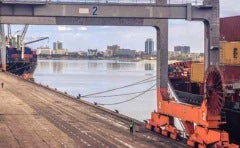
I know what I would say, loud and clear: “Your Excellency, that would have to be improving the performance of the port of Dar es Salaam.”
No doubt there are plenty of issues that matter for Tanzania’s prosperity: rural development, education, energy, water, food security, roads, you name it. They are all competing for urgent attention and effort; yet it is also true that each of them involves complex solutions that would take time to produce impact on the ground, and it is hard to know where to begin and to focus priority attention.
This is not the case for the Dar es Salaam port, as most experts know what to do.
So why the port of Dar es Salaam?
The port represents a wonderful opportunity for his country. The port handles about 90% of Tanzania’s international trade and is the potential gateway of six landlocked countries. I would tell him that almost all citizen and firms operating in Tanzania are currently affected, directly and indirectly, by the performance of this port.
When children are desperately ill in hospitals, the medicines that they urgently need to cure them are likely to be stuck inside the port. When farmers are keeling over due to excessive prices for fertilizers, this is partly as a result of the long delays at the port. Not only are the vehicles that transport us and our goods delivered to us as sea freight, they are also fuelled gasoline/petrol brought in by tankers from abroad. Come to think of it, a large portion of what Tanzanians eat, drink, or use in a typical day came into the country through the port of Dar es Salaam at some stage, either during its production or in its final state.
I would emphasize the symptoms of the current poor performance of the port. Delays in processes are generally long, very long. In mid-2012 for instance, a typical container spent an average of 20 days in the port, including the anchorage time and the time spent before the merchandise exited the premises. In Mombasa port, the same container would spend an average of four to six days, or two to three days in the world's most efficient ports.
Although this average delay masks huge variations across customers and products, it translates into significant monetary costs for shipping companies and importers that are generally passed on to local consumers. To illustrate the magnitude of these losses for his country and the region, the World Bank's Third Tanzania Economic Update has calculated that Tanzania and six neighboring countries could earn up to US$2.7 billion per year (or approximately seven percent of Tanzania's GDP) if only the performance of the Dar es Salaam port was at par with Mombasa’s.
At this stage, the President might ask what exactly he should do to improve the port's performance. The good news is that many experts involved already have an idea what to do. They have proposed to improve both the soft and hard infrastructure in and around the port. On the soft side, this means rationalizing current processes and procedures that are overly complex and end up penalizing users. For example, modifying the sequencing call of vessels and storage tariffs, as well as simplifying custom payments.
For hard infrastructure, equipment, such as cranes, needs to be modernized and new berths built to increase capacity. These well-known actions have been identified for a while now but have not yet been implemented or only at a half-hearted pace.
Leadership for Reforms
“Well,” Ndugu Kikwete might say, “if my country is losing so much money and experts know what to do, what can I do to speed up the implementation process?” My answer would be three-fold. Firstly, some of the actions require money but I would quickly explain to him that this is not the main reason for the resistance to reforms. Indeed, many actions are inexpensive and others can be funded by private operators. Ports are good businesses, including in Tanzania, and potential private investors have been queuing to invest in the port of Dar es Salaam.
Secondly, I would explain to him that the lack of progress in the implementation of efficiency enhancing reforms in the port is partly the consequence of the absence of information about the cost of inaction. Not many people are aware that a more efficient port could boost the Tanzanian and regional economies, at least not in the magnitude of the figures mentioned above.
Thirdly, and more importantly, I would point out that he would have to fight the vested interests that are gaining from the inefficient state of the port.
The port is handling about US$15 billion of merchandise and this amount is expected to grow as the result of the expansion of regional economies. What is the corruption rate on these transactions? Of course, it is difficult to capture in exact terms, but if the corruption rate is, say, 20% of the value of the traded merchandise, this will be equivalent to US$3 billion per year!
Long delays also provide an opportunity for connected users to speed up processes through illegal payments. Such opportunistic behavior would not exist with an efficient port since there would be less room for negotiation. Why would users pay extra-money if the average delay in the port was only four days?
Another group winning from the port inefficiency is constituted by domestic companies that are facing less competition from imports. Longer delays of the imports contribute to higher costs and translate into some sort of ‘protection’ for the associated local industries. This protection could be as high as 22% of the merchandise's value if it is imported by container. This is four times higher than the average official import tariff charged by customs. Thanks to this protection, domestic firms can increase their profits or have less incentive to produce the most efficient way possible. As a result, the final consumer or investor loses, either by paying too much or accepting low quality. The trade-off is of course that faced with tougher competition someday some local firms could lose jobs or disappear.
My three-minutes are gone...
At the end of my three minutes, to convince the President further, I would conclude by telling him that he should not forget the "three Cs". The reform process in the port of Dar es Salaam requires:
- More Competition - by bringing new private investors in the port to finance new investments and offer better quality services;
- Less Corruption - by reducing the opportunities for rent-seeking behaviors by specific groups, and;
- More Communication by launching a strong advocacy campaign, which will help stimulate the appetite for reforms and increase the accountability of policy makers.
Thank you, Mr. President.
* The author is the World Bank’s lead economist for Tanzania, Uganda and Burundi, and the author of the third Tanzania Economic Update titled ‘Opening the Gates: How the Port of Dar es Salaam can transform Tanzania.’


Join the Conversation